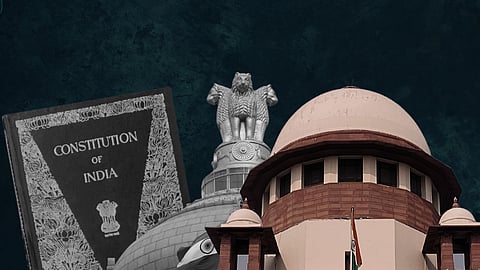

IN A RECENT SIGNIFICANT development towards establishing constitutional accountability, the Supreme Court indicated that the Speakers that the Speakers adjudicate disqualification petitions under the Tenth Schedule within a reasonable and fixed timeframe. The remark, primarily addressed to the long-pending petitions in the Telangana Legislative Assembly, comes amidst an ongoing debate over the misuse of procedural discretion by Speakers to delay decisions on defections under the Tenth Schedule. This judicial intervention also gains significance considering the recent political developments in Telangana where the disqualification of rebel Bharat Rashtra Samithi (‘BRS’) MLAs, who joined the Congress, remains unresolved.
Together, these developments point to a deeper institutional issue, wherein a lack of political will has affected the spirit of the anti-defection law under the Tenth Schedule. At the same time, it also provides an opportunity to re-examine both the strengths and limitations of the anti-defection law and its implementation.
Political defections have plagued India and several of its states, including Telangana, which has seen mass defections in recent years. Such political defections violated the Tenth Schedule, which contains the anti-defection law that aims to curb this practice. The anti-defection law, which was inserted through the 52nd Amendment, is designed to prevent political defections prompted by the lure of office, material benefits, or any other considerations.
The anti-defection law was further strengthened through the 91st Amendment in 2003 and created an exception to disqualifications if the defectors formed two-thirds of a party and merged with another party. This law gives the absolute power to the Speaker of the Assembly to decide on assembly members’ disqualifications without setting any time limit to do so, which has often rendered the law ineffective. Speakers are expected to work to ensure democratic accountability, but they have rarely been able to rise above party politics. In this regard, the Telangana issue presents a clear case of this problem. Multiple BRS MLAs have joined the Congress and petitions have been filed. The Speaker’s prolonged inaction has enabled the ruling party to consolidate its position, affecting legislative legitimacy and democratic representation.
In this light, we explore the implications of the Supreme Court's directive, analyse the legal and political dimensions of the Telangana crisis, and underscore the necessity for systemic reform to safeguard the constitutional rationale behind the anti-defection law under the Tenth Schedule.
Telangana: A constitutional crisis
Last year, several BRS MLAs defected to the ruling Congress in Telangana, significantly weakening the opposition. While disqualification petitions were filed before the Telangana Speaker, the matter has been dragging on without resolution for months, defeating the people's mandate and affecting the legislature's composition. Such delay has enabled the ruling party to consolidate power and dictate how Speakers may safeguard defectors rather than uphold democratic norms in accordance with its quasi-judicial roles under the Tenth Schedule. Thus, the Supreme Court’s response is not only remedial but also symbolic - it signals a revisit of institutional responsibilities and affirms that the functioning of constitutional offices must align with values of democratic accountability.
Constitutional ethics and the judiciary’s role
The observation of the Supreme Court must also be read in light of constitutional morality, which refers to a normative standard that demands public functionaries act not just within the letter of the law, but also in the spirit of the Constitution. Judicial deference to legislative autonomy cannot extend to tolerating dereliction of constitutional duty.
This observation draws upon previous decisions such as Kihoto Hollohan v. Zachillhu (1992), in which the Supreme Court had upheld the Speaker’s powers under the anti-defection law but subjected them to judicial review for mala fide intentions or inordinate delays. Later in Rajendra Singh Rana v. Swami Prasad Maurya (2007), the top Court held that inaction by the Speaker does not immunise defectors from disqualification. When delays become a political tool, judicial review becomes a constitutional necessity rather than an encroachment on legislative privilege.
Tenth Schedule: A legal vacuum?
One of the central flaws in the existing Tenth Schedule is the absence of a specific timeframe within which the Speaker must decide disqualification petitions. This vacuum can be abused. The Court’s judicial scrutiny in Telangana signals that such delays violate the constitutional mandate reposed in the Speaker’s office. The Court has so far resisted laying down a uniform timeline, possibly to avoid intervening in the legislative domain. Nonetheless, the constitutional functionaries cannot act with impunity. While critics have raised concerns about potential judicial overreach, it is essential to clarify that the Court is compelling constitutional compliance when constitutional offices fail to uphold their duties rather than intervening in the legislative powers.
India’s federal structure, as interpreted in S.R. Bommai v. Union of India (1994), places the Constitution above all organs of the government. Since the Speakers function as quasi-judicial bodies under the Tenth Schedule, failure to perform their roles necessitates judicial intervention. By demanding time-bound decisions, the judiciary reinforces this architecture of accountability without transgressing into the legislative domain.
Towards structural reform: Rethinking the role of the speaker
The recurring misuse of the Speaker’s powers raises the question of the adjudication power of the Speaker in defection cases. The 170th Law Commission Report had proposed that an independent tribunal headed by a retired Supreme Court judge should adjudicate disqualification petitions. However, until such reforms are enacted, the judiciary's proactive stance in the case of Telangana remains crucial for restoring faith in democratic institutions.
Laying down timelines and checking inordinate delays has reaffirmed that constitutional morality must be upheld at all times and that public office must function on constitutional tenets.
Going forward, as defections and political instability continue to test the effectiveness of Indian federalism, the importance of timely, focused, and transparent adjudication cannot be overstated. Such observations will serve as a benchmark for other states grappling with defections and reinforce the idea that power must always be exercised within constitutional limits.